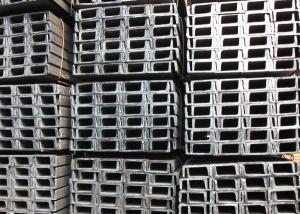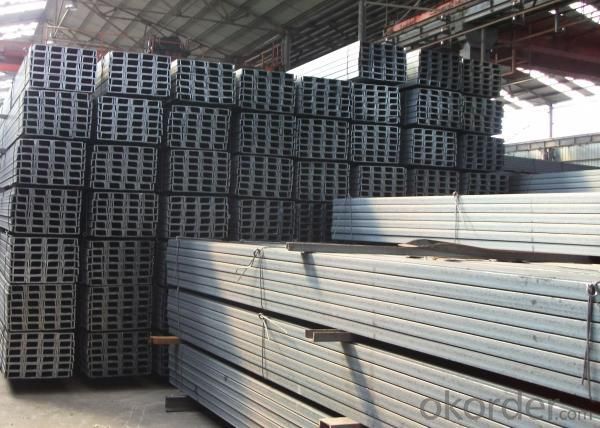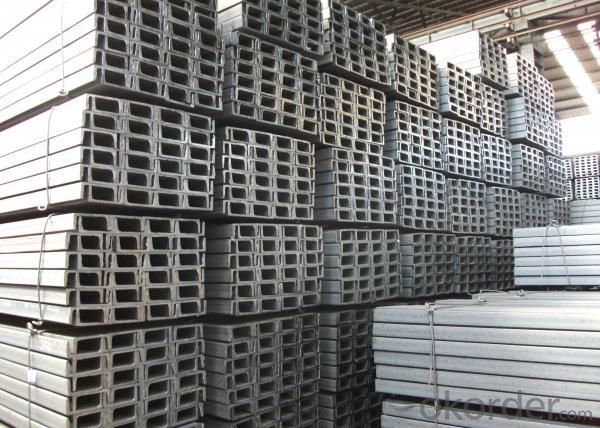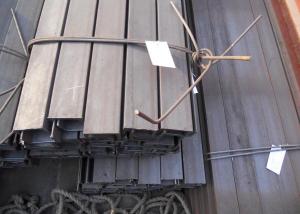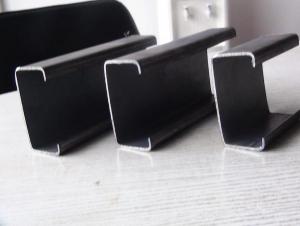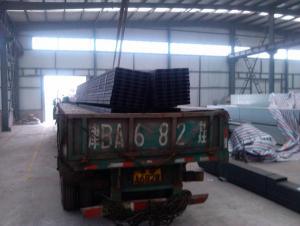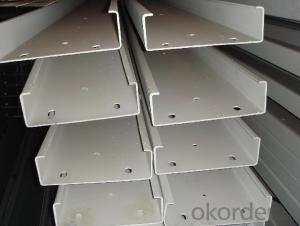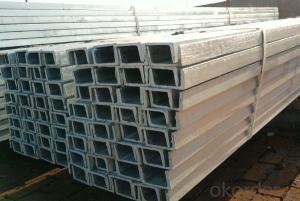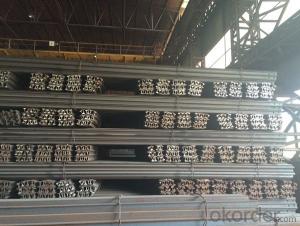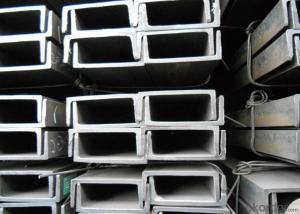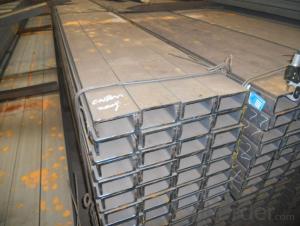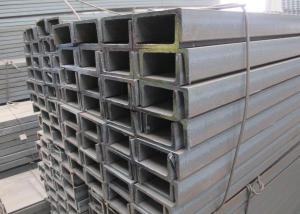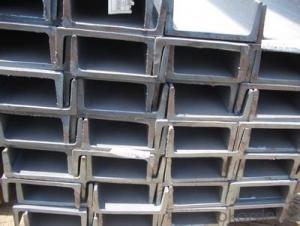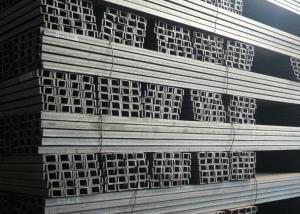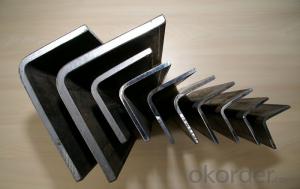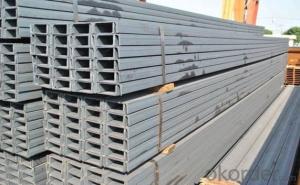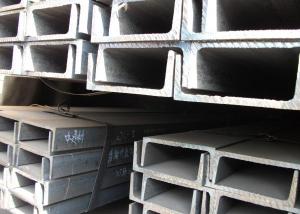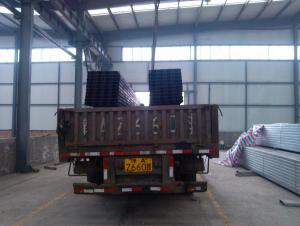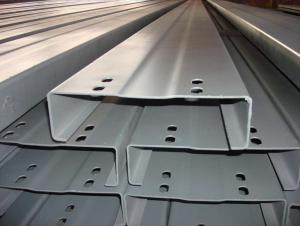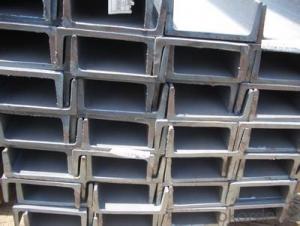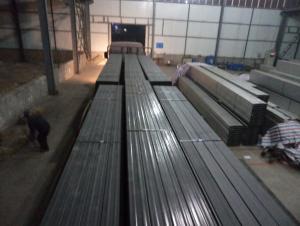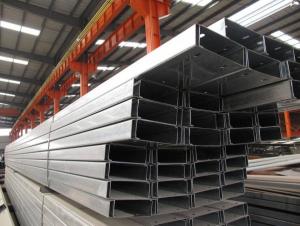JIS U CHANNEL STEEL
- Loading Port:
- Xingang Port
- Payment Terms:
- TT or LC
- Min Order Qty:
- 25MT m.t.
- Supply Capability:
- 80000TON/Year m.t./month
OKorder Service Pledge
OKorder Financial Service
You Might Also Like
Specifications of JIS U Channel Steel:
1. We are definitely speciallizing in manufacturing and supplying channel steel as per japanese standard, which is characterised with high mechanical strength and competitive prices.
Original Place | Tangshan, China | Brand Name | UINDA |
Standard | JIS G3192 : 1990 | ||
Material Grade | SS490 | ||
Sizes | 50mm to 200mm | ||
Sales Volume/Year | 3000MT | ||
Destination Area | Middle East, Africa, Southeast Asia | ||
2. The sections in details are as followings in the table-1
JIS U CHANNEL | Standard | Sectional | Dimension |
| Mass: |
| (mm) | (mm) | (mm) | (mm) |
|
50x25 | 50 | 25 | 3.0 | 6.00 | 2.37 |
75X40 | 75 | 40 | 3.8 | 7.00 | 5.30 |
75X40 | 75 | 40 | 4.0 | 7.00 | 5.60 |
75X40 | 75 | 40 | 4.5 | 7.00 | 5.85 |
75X40 | 75 | 40 | 5.0 | 7.00 | 6.92 |
|
|
|
|
|
|
100X50 | 100 | 50 | 3.8 | 6.00 | 7.30 |
100X50 | 100 | 50 | 4.2 | 6.00 | 8.03 |
100X50 | 100 | 50 | 4.5 | 7.50 | 8.97 |
100X50 | 100 | 50 | 5.0 | 7.50 | 9.36 |
|
|
|
|
|
|
125X65 | 125 | 65 | 5.2 | 6.80 | 11.66 |
125X65 | 125 | 65 | 5.3 | 6.80 | 12.17 |
125X65 | 125 | 65 | 5.5 | 8.00 | 12.91 |
125X65 | 125 | 65 | 6.0 | 8.00 | 13.40 |
|
|
|
|
|
|
150x75 | 150 | 75 | 5.5 | 7.30 | 14.66 |
150x75 | 150 | 75 | 5.7 | 10.00 | 16.71 |
150x75 | 150 | 75 | 6.0 | 10.00 | 17.90 |
150x75 | 150 | 75 | 6.5 | 10.00 | 18.60 |
150x75 | 150 | 75 | 6.5 | 10.00 | 24.00 |
|
|
|
|
|
|
200X80 | 200 | 80 | 7.5 | 11.00 | 24.60 |
Table-1
3. The mechanical property of JIS U Channel Steel in the table-2:
Grade | Yield Strength,N/mm² | Extension Strength N/mm² | |||
Thickness of Steel,mm | |||||
≦16 | >16-≦40 | >40-≦100 | >100 | ||
SS490 | ≧285 | ≧275 | ≧255 | ≧245 | 490-610 |
Table-2
4. The chemical composition of JIS U Channel Steel as per SS490 in the table-3
Grade | Element(%) | |||
C | Mn | P | S | |
SS490 | - | - | ≦0.050 | ≦0.050 |
Table-3
Usage of JIS U Channel Steel:
1.The JIS U Channel Steel can be devided into two kinds, namely common channel steel and light channel steel. The sizes of hot rolled common channel steel range from 5# to 40#. Meanwhile, the channel steel can be divided into cold forming sectional equal channel steel, cold forming sectional unequal channel steel, cold forming inner edge channel steel and outer edge channel steel.
2.The JIS u channel steel is usually used for arch-itechtural structure, and they could be welded in order to support or hang a vari-ety of facilities. They are also usually used in combination with I beam. The channel steel with sizes under 14# is usually applied to construction engineering, as purline, while the channel steel with sizes above 16# is more likely to be used in building vehicle chassis structure and mechanical structure. Furthermore, the channel steel in sizes above 30# are target at building bridge structure, as tension bar.
3.In a word, the channel steel must possess perfect welding property, riveting property and mechanical property and so on.
Package & Delivery of JIS U Channel Steel:
1.The JIS u channel steel will be packed in bundle with steel wire at each end of every bundle and color marking in order to help the customer to recognize his goods more easily at sight.
2. And the channel steel could be loaded into 20ft or 40ft container, or by bulk cargo.If the weight of each bundle reaches more than 3.5 mt, the loading by break bulk cargo should be choosed.When the weight of each bundle reaches less than 3mt, the loading by container should be choosed.
3.As for the transportaion from mill to loading port, the truck will be usually used. And the maximum quantity for each truck is 40mt.
4.All in all, we could do in accordance with customer's request.
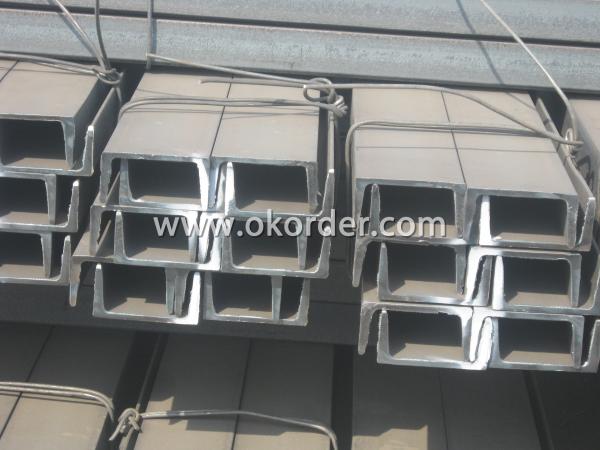
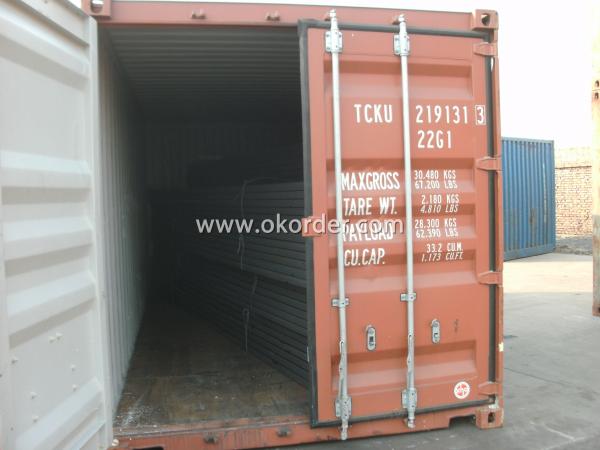
Production Flow of JIS U Channel Steel:
1.The steel billet shall be heated in the high temperature furnace.
2. The heated steel billet shall be rolled five to nine times with the aim of shaping the general figure of steel u channel.
3. The rolled steel u channel should be put onto the cooling bed to make the temperature low.
4. The steel u channel should be straighted on the straightener.
5. The straighted steel u channel will be cut into meters by saw, as per customer's requirements.
6. At the last part of production, the channel steel must be tested in order to confirm that the finished products are completely free from crack, pore, slag, scab or fold on the surface.
- Q: How are steel channels used in the manufacturing of machinery?
- Steel channels are commonly used in the manufacturing of machinery as structural components that provide strength, support, and stability. They are often used to create frames, bases, and supports for various machine parts and components. Steel channels help ensure the structural integrity of the machinery, allowing it to withstand heavy loads and vibrations during operation. Additionally, they can be used to guide and direct movement, such as in conveyor systems or assembly lines. Overall, steel channels are essential in the manufacturing of machinery to enhance its durability and functionality.
- Q: The types of channel steels are 6, 8, 10, 12, 16, 20, 25, 32 and 14. What are their tensile strength of these types of channel steel?
- Tensile strength and yield strength are independent of size and size, but only material.
- Q: What about channel 16?
- The specifications are expressed in millimeters of height (H) * leg width (b) * waist thickness (d), such as 100*48*5.3, which means waist height is 100 mm, leg width is 48 mm, waist thickness is 5.3 mm channel, or 10# channel steel. The same height of the channel, if there are several different leg width and waist thickness, also need to add a, B, C on the right side of the model to distinguish, such as 25#a, 25#b, 25#c and so on.
- Q: A solar roof concrete foundation steel embedded parts, steel embedded parts are welded on the welding channel, two channel to head to head up, ask whether the welding part of a steel plate welding lining need? Or what other requirements? What norms do these requirements come from? Thank you
- Butt welding, full welding, through the groove just fine! What about steel plates? No way, single-sided welding, double-sided molding
- Q: How do steel channels contribute to the overall sustainability of a building?
- Steel channels contribute to the overall sustainability of a building in several ways. Firstly, they provide structural support, ensuring the building's longevity and reducing the need for frequent repairs or replacements. Additionally, steel channels can be made from recycled materials, reducing the environmental impact of manufacturing processes. Their durability also minimizes waste generation over time. Furthermore, steel is a highly recyclable material, allowing for easy and efficient reuse at the end of a building's life cycle. Overall, steel channels help create sustainable and resilient buildings by promoting resource efficiency, reducing waste, and supporting long-term durability.
- Q: Can steel channels be used for staircase stringers?
- Yes, steel channels can be used for staircase stringers. Steel channels are commonly used for staircase stringers due to their strength, durability, and ability to support heavy loads. They provide a sturdy and reliable framework for the stairs, ensuring stability and safety. Additionally, steel channels can be easily customized and fabricated to fit specific staircase designs and dimensions.
- Q: Are steel channels suitable for use in piping systems?
- No, steel channels are not suitable for use in piping systems. Steel channels are typically used for structural support or framing in construction projects and are not designed to handle the pressure and flow of fluids in piping systems. Piping systems require materials that are specifically designed and tested for their ability to withstand high pressure, corrosion, and temperature fluctuations. Common materials used in piping systems include steel pipes, copper pipes, and various types of plastic pipes that are specifically engineered for the job.
- Q: Can steel channels be welded or joined together?
- Yes, steel channels can be welded or joined together. Welding is a common method used to connect steel channels and create a strong joint. Welding involves heating the steel channels to a high temperature, melting the edges, and then allowing them to fuse together as they cool. This creates a bond that is as strong, if not stronger, than the original steel. Joining steel channels can also be achieved through other methods such as bolting or using specialized connectors. However, welding is often preferred due to its ability to create a seamless and continuous connection between the steel channels, resulting in a more structurally sound joint.
- Q: How do steel channels contribute to energy efficiency?
- Steel channels contribute to energy efficiency by providing a strong and durable framework for buildings, allowing for better insulation and reduced energy wastage. They also facilitate the installation of energy-efficient systems, such as HVAC and electrical systems, which further enhance energy efficiency.
- Q: What are the factors to consider when selecting steel channels for a project?
- When selecting steel channels for a project, there are several important factors to consider. First, it is crucial to determine the specific load requirements of the project. This includes considering the weight that the steel channels will need to support and the stress or pressure they will be subjected to. Next, the dimensions and sizes of the steel channels should be evaluated. This involves assessing the height, width, and thickness of the channels to ensure they are suitable for the intended application and can provide the necessary structural support. The material grade of the steel channels is another vital factor. Different steel grades offer varying levels of strength, durability, and corrosion resistance. It is important to select a grade that aligns with the environmental conditions and longevity requirements of the project. Furthermore, the fabrication and installation process should be considered. Factors such as ease of welding, cutting, and forming the steel channels can impact the overall efficiency and cost-effectiveness of the project. Lastly, factors like cost, availability, and supplier reputation should also be taken into account. It is essential to source the steel channels from reliable and reputable suppliers who can provide high-quality products within the project's budget.
1. Manufacturer Overview
| Location | Hebei, China |
| Year Established | 1993 |
| Annual Output Value | Above US$100 Million |
| Main Markets | South Asia Middle East; Southeast Aisa; south Korea |
| Company Certifications | ISO 9001:2000 |
2. Manufacturer Certificates
| a) Certification Name | |
| Range | |
| Reference | |
| Validity Period |
3. Manufacturer Capability
| a) Trade Capacity | |
| Nearest Port | Tianjin; |
| Export Percentage | 1% - 10% |
| No.of Employees in Trade Department | 11-20 People |
| Language Spoken: | English; Chinese |
| b) Factory Information | |
| Factory Size: | Above 20,000 square meters |
| No. of Production Lines | 1 |
| Contract Manufacturing | OEM service offered |
| Product Price Range | average |
Send your message to us
JIS U CHANNEL STEEL
- Loading Port:
- Xingang Port
- Payment Terms:
- TT or LC
- Min Order Qty:
- 25MT m.t.
- Supply Capability:
- 80000TON/Year m.t./month
OKorder Service Pledge
OKorder Financial Service
Similar products
Hot products
Hot Searches
Related keywords
